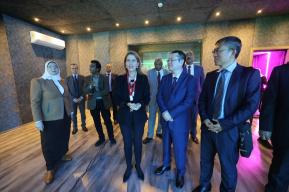Press release
84 million children at risk of still being out of school by 2030
New York and Paris, 6 July 2022 – According to a new UNESCO report, if they do not take additional measures, only 1 in 6 countries will meet Sustainable Development Goal 4 and achieve universal access to quality education by 2030. There will still be an estimated 84 million children and young people out of school by the end of the decade.
One week after the call for mobilization launched by Audrey Azoulay, Director-General of UNESCO, at the Transforming Education Pre-Summit in Paris attended by more than 150 ministers, the new UNESCO report “Setting commitments: National SDG 4 benchmarks to transform education” come as a new stark reality check for political and civil society leaders.
According to the UNESCO report , based on data provided by nine in ten UNESCO Member States, countries anticipate that the percentage of students achieving basic skills in reading at the end of primary school will increase from 51% in 2015 to 67% in 2030. Despite this progress, an estimated 300 million children and young people will still not have the basic numeracy and literacy skills they need to succeed in life.
Furthermore, despite the promise of universal secondary school completion, only one in six countries aim to meet this target by 2030, and just four in ten youth in sub-Saharan Africa will be completing secondary school. Governments’ data shows that even if national targets are met, these are insufficient: there will still be an estimated 84 million children and young people not attending school by the end of the decade.
Strengthening efforts to meet the needs
The majority of governments have now set national benchmarks for progress towards the crucial education goal: it is a sign of serious commitment. But the international community now has the responsibility to boost their efforts by filling the remaining data gaps and by prioritising education funding. It is the only way to respond to identified needs and create a truly transformative impact.
COVID-19 aggravated the existing education crisis. By 2030, far too many children are expected to remain out of classrooms. We can and must do better. UNESCO’s leadership is important in supporting governments to set benchmarks at this critical time.
The report calls for strengthening regional and international cooperation, so that each country can draw inspiration from its peers in developing and implementing solutions. UNESCO is committed to facilitating this dialogue among its 193 Member States and will continue to provide its expertise to help improve countries’ monitoring and reporting of SDG 4 targets as we approach 2030.
***
Note to Editors:
The report, “Setting commitments: National SDG 4 benchmarks to transform education” is the largest ever exercise to determine realistic educations ambitions for 2030. It compiles the findings from the culmination of a five-year process that has enabled countries to set their own targets towards achieving “universal access to quality education”.
Nine out of ten countries now have national benchmarks which consider their unique context providing clear insights into what their contribution will be to the global education goal. Participating countries identified their targets for 2025 and 2030 relative to six key SDG 4 indicators on: early childhood education attendance; school attendance; completion; minimum proficiency in reading and mathematics; trained teachers; and public education expenditure.
This work answers a call by the UN Secretary General in his Synthesis Report in 2014 on countries to do “benchmarking for progress’ and follows the Education 2030 Framework for Action that called on countries to establish ‘appropriate intermediate benchmarks (…) for addressing the accountability deficit associated with longer-term targets”.
Note to Editors
* Country level data is available, please contact the media team for more information.
About GEM Report
The Global Education Monitoring Report (GEM Report) is developed by an independent team and published by UNESCO. It has the official mandate of monitoring progress in meeting the Sustainable Development Goal on education, SDG 4.
About UNESCO Institute for Statistics
The UNESCO Institute for Statistics is the statistical office of UNESCO and is the UN depository for cross-nationally comparable statistics on education, science and technology, culture, and communication.










